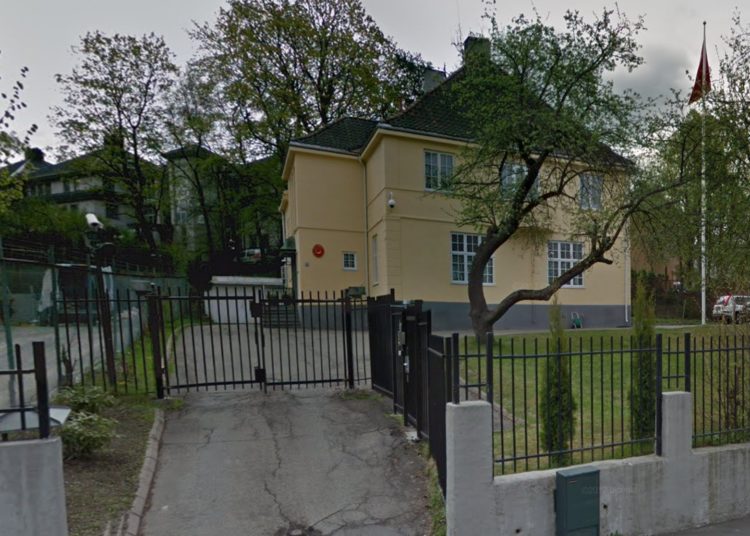Nordic Monitor
Critics of Turkish President Recep Tayyip Erdoğan who had been profiled by the Turkish Embassy in Oslo were included in a terrorism probe based on fabricated charges by a Turkish prosecutor, judicial documents obtained by Nordic Monitor have revealed.
The judicial documents indicate that the Turkish Embassy gathered information on Turkish and Norwegian citizens believed to be affiliated with the Gülen/Hizmet movement, a group critical of President Erdoğan, and that Turkish educators, representatives of local associations and businessmen living in Norway had been profiled by Turkish diplomats. The documents show critics who have been living in Norway for decades as well those who have recently sought refuge there to escape a massive crackdown in Turkey were also spied on.
The information that was reported to the foreign ministry in Ankara was later used in a criminal indictment for a charge of terrorism by a Turkish prosecutor.
Last year, Nordic Monitor released an official communiqué from the Directorate General for Consular Affairs at the foreign ministry dated October 21, 2016 confirming how Turkish and Norwegian nationals representing Norwegian schools, dialogue foundations and human rights institutions were profiled as members of a terrorist organization by Turkish diplomatic personnel.
Judicial documents dated December 12, 2018 reveal spying on critics in Norway by the Turkish diplomatic missions. (The addresses and names of the Turkish nationals have been redacted for security reasons.):
According to a December 12, 2018 decision by prosecutor Birol Tufan, the Ankara Chief Public Prosecutor’s Office launched a separate investigation (file no. 2018/ 27425) into 97 Turkish nationals in Norway who were listed in espionage files dispatched by Turkish diplomats in the country without any concrete evidence of wrongdoing.
According to the documents they were charged with “membership in a terrorist group” by Tufan. The investigation was based on spying files created at the Turkish Embassy in Oslo between 2016 and 2018.
Critics of the Erdoğan government abroad, especially members of the Hizmet/Gülen movement, have been facing surveillance, harassment, death threats and abduction since President Erdoğan decided to scapegoat the group for his own legal troubles. They have often been denied consular services such as power of attorney and birth registry as well as having their passports revoked. Their assets in Turkey are seized and their family members at home are at risk of criminal charges.

An August 2019 report by Nordic Monitor that disclosed a foreign ministry document exposed that the Norlights International School and Oslo Wergeland International School, which were funded by the Norwegian state; the Norwegian-Turkish Chamber of Commerce; intercultural centers and nonprofit and volunteer organizations such as Moss Kultur-org, Mangfoldhuset Trondheim and Mangfoldhuset Ung; and Time to Help, a humanitarian aid organization, were listed in the espionage document dispatched by Turkish diplomats in Norway.
Time to Help has successfully completed major projects in a range of countries, including sinking wells, providing medical care for cataract sufferers and setting up food tents and bringing relief to people affected by disasters.
New judicial documents once more confirmed that spying activities by Turkish diplomatic missions result in serious consequences in the Turkish judicial system.

Foreign Minister Mevlüt Çavuşoğlu confirmed systematic spying on Turkish government critics on foreign soil as by Turkish diplomatic missions in February, 2020. Çavuşoğlu said Turkish diplomats assigned to embassies and consulates have officially been instructed by the government to conduct such activities abroad. “If you look at the definition of a diplomat, it is clear. … Intelligence gathering is the duty of diplomats,” Çavuşoğlu told Turkish journalists on February 16, 2020 following the Munich Security Conference, adding, “Intelligence gathering and information collection are a fact.”
In the aftermath of a coup attempt in Turkey on July 15, 2016, some Western countries investigated the intelligence activities of Turkish Foreign Ministry personnel, representatives from relevant authorities, imams and intelligence officers accredited as diplomats.
In 2018 the Swiss attorney general launched a criminal inquiry into spying on Switzerland’s Turkish community by Turkish diplomats. The Swiss foreign ministry confirmed that the accusations outlined in the criminal proceedings were not diplomatic tasks and that therefore the people concerned could not avail themselves of immunity. Two of them had to leave Switzerland as a result of the investigation.
In December 2016 Turkey had to recall Yusuf Acar, the religious affairs attaché at the Turkish Embassy in The Hague, after Dutch authorities accused him of gathering intelligence on the movement. Similarly, Belgian authorities rejected the visa applications of 12 Turkish imams seeking to work in the country in 2017. The government of the central German state of Hessen ended its cooperation with the Turkish-Islamic Union for Religious Affairs (Diyanet İşleri Türk İslam Birliği, or DITIB).
Austria is currently investigating espionage operations carried out by an Austrian national of Turkish origin who was spying on Turkish citizens and sending reports to security authorities in Ankara. Austrian Interior Minister Karl Nehammer held a press conference confirming that the spy had confessed to being “recruited by the Turkish secret service to spy on other Turkish citizens or Austrian citizens with a Turkish migration background to then report them to the Turkish security authorities.”
Most recently, Feyyaz Ö., an Italian citizen of Turkish origin, confessed that he was ordered in August by Turkey’s National Intelligence Organization (MIT) to kill Kurdish-Austrian politician Berivan Aslan, a member of Austria’s Green Party. Aslan had previously revealed a network of Turkish intelligence agents in several Austrian provinces, including the capital, Vienna.












